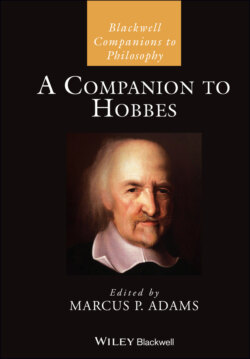Читать книгу A Companion to Hobbes - Группа авторов - Страница 38
2.2.3 Causality
ОглавлениеFor Hobbes, the knowledge of effects from their causes, and vice versa, is the defining feature of philosophy (EW I.3). His own analysis of the causal relation, presented mostly in chapter IX “Of Cause and Effect” in De corpore, is rich and somewhat neglected.17 Here, I will explore one important aspect of this analysis, which is strongly reminiscent of the Stoics’. Together with Spinoza, Hobbes is perhaps the strictest early modern “necessitarian” about the causal connections among bodies. A cause “simply” or “entirely” is a collection of accidents such that “when they are all thought to be present it cannot be understood but that the effect is produced at that same instant. And if any of them be wanting it cannot be supposed but that the effect is not produced” (EW I.122). Men call things “contingent, whereof they do not perceive the necessary cause” (EW I.130). Hobbes argues the conceptual inter-dependence of simple causes and their effects is crucial for several principles at the foundation of his physics, including “no action at a distance” (EW I.125), “same cause/same effect” (EW I.125-6), and the inertia of both motion and rest (EW I.125).
The Stoics are committed to very similar causal principles. Alexander attributes to the Stoics that “from everything that happens, something else follows, with a necessary causal dependence on it, and everything that happens has something prior to it with which it causally coheres” (LS 1987, 337; see also LS 1987, 333; 389–90). Like Hobbes, the Stoics emphasize that the necessary connection applies to what they call “complete” or “sustaining” causes, i.e., “one during whose presence the effect remains and on whose removal the effect is effect is removed” (LS 1987, 336). As Hobbes later does, they derive from this conception of complete causality the principle that “where all the same circumstances obtain it is impossible that a result that does not ensue on one occasion should ensue on another” (LS 1987, 338). We call things “accidental” or “spontaneous” only because “there are causes hidden from our sight” (Plutarch, On Stoic Self Contradictions; In Sambursky 2014, 56). And they hold that all causal connections are by direct contact or through the medium of pneuma (Sambursky 2014, 54). As Hobbes later would, albeit from a more sophisticated and quantitative perspective, the Stoics perceived their necessitarian causal principles as required by their overall materialist cosmology: “the world would be wrenched apart and divided and no longer form a unity, forever governed by a single ordering and management, if an uncaused motion were introduced” (LS 1987, 337–8; see also Sambursky 2014, 130).18
